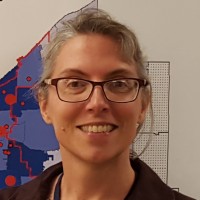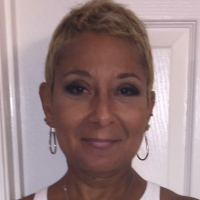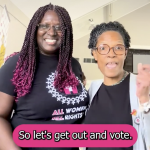Click here to read a digital edition of this article.
Introduction | A-C | D-G | H-K | L-O | P-S | T-Z
Julie Patterson
HIV Negative
Novelty, Ohio

Julie Patterson
Julie is the founder of Silver Creek Strategies. The consulting agency works to close public health gaps in northeast Ohio through technical assistance, strategic community partnerships and training. One of its focuses is HIV, which has been a part of Julie’s work for more than 25 years. She got her start as a volunteer with the Chicken Soup Brigade in Seattle and as a volunteer for women’s programs at the Northwest AIDS Foundation in the late ’90s. Julie previously worked as the director of capacity building at the AIDS Taskforce of Greater Cleveland. These days, she juggles multiple roles. She is chair of Case Medical Center/University Hospitals’ AIDS Clinical Trials Unit’s Community Advisory Board and a prevention advocate with the international group AVAC, and she is a member of the HIV Vaccine Trials Network Social and Behavioral Working Group and the Ohio HIV Criminalization Working Group.
Laura Pinsky
HIV Negative
New York, New York

Laura Pinsky
Laura was an early ally in the fight against HIV/AIDS. She founded one of the first AIDS groups on a college campus—Columbia’s Gay Health Advocacy Project (GHAP), in 1985. At a time of intense stigma and lack of information, the organization worked with New York City HIV doctors to get expert treatment and helped launch student support groups—an outreach model that has since been replicated by colleges and universities across the United States. GHAP also held the first conference in New York City to provide up-to-date medical information for people living with HIV. The organization continues to provide HIV testing and access to treatment and psychological support and has gotten 300 students to take PrEP (the organization also provides PEP). Laura is the coauthor of The Essential AIDS Fact Book and The Essential HIV Treatment Fact Book, which HIV/AIDS advocates consider to be a sort of “AIDS bible” for HIV care, treatment and prevention.
Aracelis Quiñones
HIV Positive
New York, New York

Aracelis Quiñones
Poder Latino means “Latin Power.” It’s fitting, then, that Aracelis is the group coordinator of Poder Latino, a group of HIV-positive Latinos that meets once a month for training on AIDS policy and advocacy and on ways to take care of themselves in order to improve health outcomes and boost self-esteem. Part of the Latino Commission on AIDS, Poder Latino has about 50 members. The group couldn’t have a more fearless leader than Aracelis. Diagnosed with AIDS nearly 30 years ago, she has also battled hepatitis C and cancer. Yet she always found the strength to survive—and thrive. She works hard to help others understand that “with HIV treatment everything is possible. United, we can conquer anything we want.” Now that’s power!
Shakyara Ralat
HIV Negative
Orlando, Florida

Shakyara Ralat
Shakyara is a transgender woman and HIV-negative ally. She currently works as a community liaison for the TRANSaction program, a six-part educational series that supports and empowers Latinx and African-American members of the trans community at Bliss Healthcare Services. The clinic in Orlando provides medical care, prevention strategies and testing, among other services, for patients with or at risk for HIV. Shakyara is also a member of the 2018 USCA host committee. Because she is committed to preventing the spread of HIV, Shakyara strongly advocates for PrEP, which she also takes. As a colleague noted, “She is a huge part of our success, and we are lucky to have her.”
Paige Rawl
HIV Positive
Indianapolis, Indiana

Paige Rawl
Just before her third birthday, Paige and her mother were diagnosed with HIV. However, Paige wouldn’t find out until she was much older. After sharing her status with a best friend in elementary school, she was severely bullied by her classmates, causing her emotional and mental trauma. At 14, she began sharing her story with students in schools and became the youngest person to be certified as an HIV/AIDS educator with the American Red Cross. In 2014, her book about her journey with HIV, Positive: A Memoir, was released. At 24, she continues to travel the world to educate young people about HIV/AIDS and advocate against bullying. Her plan is to start her own organization, Paige Power, to further her mission.
Venita Ray
HIV Positive
Houston, Texas

Venita RayJonathan Timmes
In 2003, Venita learned that she was HIV positive after 18 years of sobriety, a second chance at life and a new career as a lawyer. She is the public policy manager for Legacy Community Health Services in Houston. She oversees its Positive Organizing Project (POP+), an advocacy and leadership-training program for those living with HIV. Venita was also instrumental in creating the first-ever roadmap to ending HIV in Houston, which inspired the state of Texas to draft its own plan to end the epidemic. Armed with legal knowledge, she has advocated against the criminalization of HIV and encouraged Texans with HIV to fight for the passage of legislation that better addresses AIDS and other public health challenges. She’s also a board member of PWN-USA.
Debra Richardson
HIV Positive
Birmingham, Alabama

Debra Richardson
Debra has overcome a lot—substance abuse, homelessness and unemployment. Diagnosed in 1995, she started out at AIDS Alabama as a client in 2006 before being hired three years ago to be a peer support specialist for its Living Well study, which linked peers with new and most at-risk clients. Today, she is a patient navigator for its collaborative Birmingham-Comprehensive High-Impact Prevention Project. Funded by the CDC, its purpose is to address gaps in the local HIV treatment continuum of care and enhance existing HIV testing programs that will in turn reduce new infections in the state. She’s also a residential assistant at Olivia’s House, an alcohol and drug rehabilitation center for women with children. Debra exemplifies how owning your status can positively impact not only yourself but also others.
Valerie L. Rochester
HIV Negative
Washington, DC

Valerie Rochester
Valerie has been advocating and fighting for the HIV prevention, care and treatment needs of Black women for the last 25 years. Currently, she’s the vice president for program strategy at AIDS United, where she helps guide the organization’s expansive programs portfolio and its grant-making efforts in order to invest in communities affected by the epidemic. Throughout the years, she has worked on initiatives with the CDC, the Substance Abuse and Mental Health Services Administration and the Health Resources and Services Administration to elevate the profile of Black women affected by the epidemic and to ensure that the voices of women of color are heard. Along with the Black Women’s Health Imperative, Valerie recently helped launch the first national PrEP awareness campaign tailored to Black women.
Connie Roebuck
HIV Positive
Forrest City, Arkansas

Connie Roebuck
Connie—aka “The Condom Lady”—wants people to know their status and to use protection. After being diagnosed with HIV in 1996, she vowed to become an aggressive promoter of safer sex, health education and condom distribution. And as project manager of The Roebuck Project, she’s done just that. Connie has given out more than 35,000 condoms at health fairs and testing events. She utilizes testing not only as prevention but also as a way to link HIV-positive individuals to care. She’s a member of the Arkansas HIV Planning Group and in 2016, the story of how she contracted the virus from her partner was told in the stage play Love Has No Protection. Through her unique platform, she’s able to reach many different groups within her beloved community. No matter who you are, The Condom Lady is there for you!
Diana Rowan
HIV Negative
Charlotte, North Carolina

Diana Rowan
As an associate professor of social work at the University of North Carolina at Charlotte, Diana has conducted research that works to improve the lives of people living with HIV as well as those most at risk for the virus. For the past five years, she’s been the principal investigator for the CDC’s Minority AIDS Research Initiative, which works to build prevention research capacity in Black and Hispanic communities. Her work also explores how to combat the virus in sub-Saharan Africa. In 2013, she released her textbook, Social Work with HIV and AIDS: A Case-Based Guide. Diana also sits on the NCAAN board of directors.
Shirley Royster
HIV Positive
Dorchester, Massachusetts

Shirley Royster
Shirley was 39 when she learned she had HIV in 1989. The Black lesbian mother of two didn’t expect to see 40, partly because the resources she found weren’t geared to her. But with the support of her partner, Catherine, the strength of her faith, and the help of Jim Campbell (an HIV-positive gay man), she became an advocate and adviser, helping local AIDS groups reach out to the growing numbers of African Americans testing HIV positive. Soon she became a voice for people of color in state and national organizations, working with Boston Public Health, Positive Directions and New England AIDS Education and Training. Currently, she’s helping staff at Victory Programs’ Boston Living Center, a resource center for people with HIV, to develop programming for women.
Beverly Sha
HIV Negative
Chicago, Illinois

Beverly Sha
An infectious disease specialist with three decades of experience, Beverly was named a top doc by Chicago Magazine from 2008 to 2016. She’s also a professor at Rush University Medical Center, where, in addition to treating patients, she directs the hospital’s highly successful clinical research site for the AIDS Clinical Trials Group Network as well as the Women’s Interagency HIV Study. She’s also made the unique challenges faced by women with HIV the focus of much of her published research. When accepting an award presented to her by the AIDS Legal Council of Chicago for the people living with HIV whom she serves, Beverly stated, “Patients show graciousness and courage and they show how much we can accomplish if we work together.”
Judith Shaw
HIV Positive
Baltimore, Maryland

Judith Shaw
When Judith learned she was HIV positive in 1992, she went down a rocky, tumultuous path that led to alcohol and drug abuse. But through therapy and forgiveness, she eventually found it in herself to rise above it all. Now, she is living her life with purpose. She is a community health peer specialist with Total Health Care, a health center that provides early intervention services for people living with HIV, and she works closely with the 50-and-over community. As Judith says, “People are living longer with HIV, so I’m honored and blessed to be a part of that growing population and preparing for the generations that come behind me.”
Arianna Smith
HIV Negative
Chicago, Illinois

Arianna Smith
A dedicated community leader, Arianna has worked with a number of projects to enhance the lives of people living with HIV on both the local and national levels. She is the program and training coordinator at the federally funded Midwest AIDS Training + Education Center, which provides HIV training and support services to health care professionals in nine Midwestern states. Her efforts have included redesigning a peer navigation project with a local Chicago HIV clinic, supporting the integration of routine HIV screening into clinical systems within the state and enhancing access to care for formerly incarcerated individuals in a statewide plan. Those affected by or at risk for HIV are in good hands with Arianna.
Jennie Smith-Camejo
HIV Negative
Miami, Florida

Jennie Smith-Camejo
As communications director for PWN-USA, Jennie is responsible for overseeing the media and communications strategy that support the organization’s mission, which is to involve HIV-positive women in all levels of policy and decision-making to improve the quality of women’s lives. This includes a heavy focus on social media, from arranging Twitter chats to curating posts and hashtags that not only support the national network but also encourage folks to become involved and take action. She also trains PWN-USA members on how to speak to the media, helps connect them to various media outlets and creates content that highlights the advocacy efforts of the group’s members. Her activism also reaches the streets. This year, she’s been especially active in protests on behalf of health care and immigrants’ and women’s rights. In July, she went to Capitol Hill in protest of a GOP health care bill and was arrested alongside fellow activists.
Meta Smith-Davis
HIV Positive
Baton Rouge, Louisiana

Meta Smith-Davis
Meta believes in the power of one’s voice, which is why she works hard to empower people living with HIV to find their own. Her goal? To help them become self-advocates. She is the assistant director of prevention services at the HIV/AIDS Alliance for Region Two (HAART) in her hometown of Baton Rouge and the coordinator of the local People Living with HIV Stigma Index Project. But her work doesn’t end there. Meta also cochairs the Louisiana chapter of PWN-USA. You might have even seen her at this year’s USCA, where she participated in a panel and workshop on stigma. She is “always willing and ready to be of service to others.”
Cindy Stine
HIV Negative
Dingmans Ferry, Pennsylvania

Cindy Stine
Cindy is an integral member of the Sero Project, a network of people living with HIV and their allies fighting for freedom from stigma, criminalization and injustice. Recently, she helped launch the organization’s Network Empowerment Project, which seeks to strengthen advocacy, education, recreation and service groups for people living with HIV/AIDS across the country. Cindy is also the Sero Prisoner Survivor Network coordinator; in that role, she receives hundreds of letters from individuals currently incarcerated under HIV-specific laws, helps media organizations tell their stories and sends annual Christmas cards to all those who write her. She also is closely involved in planning Sero’s biannual HIV Is Not a Crime Training Academy for fellow advocates.
Blake Strasser
HIV Negative
Brooklyn, New York

Blake Strasser
While on a really bad date nearly 21 years ago, Blake asked to be excused to use the restroom, where she noticed a postcard for an AIDS bike ride, from Boston to New York. She’d already lost many friends to the epidemic, so she signed up immediately and hasn’t stopped pedaling since. Producing charitable sporting events is now her full-time job. This includes the Braking AIDS Ride, which benefits Housing Works. Her advocacy doesn’t stop when she dismounts her bike, though. Often sporting an HIV-related T-shirt, she’s a go-to person for younger people in her Brooklyn neighborhood seeking information about testing and safer sex. She served on the national board of Positive Pedalers and is active with the New York chapter. As a riding coach and mentor, this quick-witted triathlete has helped countless others push past their physical and mental limits while raising funds—she has personally raised well over $100,000 for various organizations and has helped others raise millions.
Teresa Sullivan
HIV Positive
Philadelphia, Pennsylvania

Teresa SullivanJonathan Timmes
Teresa knows what it’s like to be living with HIV behind prison walls. That’s why she’s the coordinator of TEACH Outside—a five-week program for people living with HIV who have been incarcerated—at the ASO Philadelphia FIGHT. TEACH trains these individuals to become HIV peer educators and community leaders. Teresa is also the core member and writer for FIGHT’s quarterly newsletter, Prison Health News. A member of PWN-USA’s board of directors, Teresa is an active member of its Philadelphia chapter and was recently chosen for its inaugural PWN-USA Policy Fellowship program. Her mission is to end HIV stigma and to continue advocating for prisoners’ rights.
Introduction | A-C | D-G | H-K | L-O | P-S | T-Z
To read the 2016 POZ 100, click here.
To read the 2015 POZ 100, click here.
To read the 2014 POZ 100, click here.
To read the 2013 POZ 100, click here.
To read the 2012 POZ 100, click here.
To read the 2011 POZ 100, click here.
To read the 2010 POZ 100, click here.







Comments
Comments